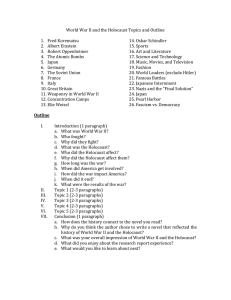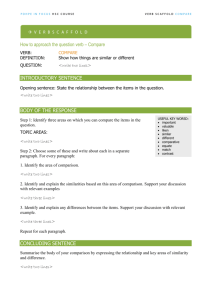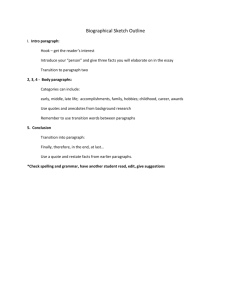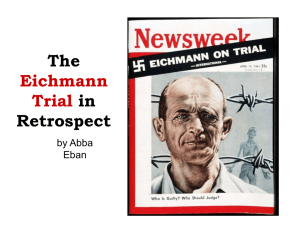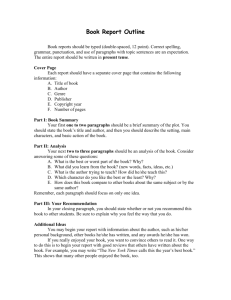English II
advertisement
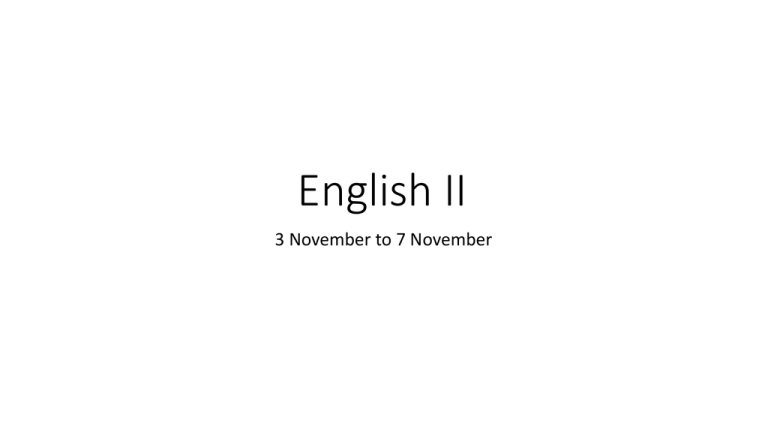
English II 3 November to 7 November 3 November Warm Up: Parts of Speech Review – Prepositions & Interjections Essential Question: What is civil disobedience and passive resistance? Today’s Agenda: • Indian Non-Fiction – India’s Long Road to Independence Tomorrow’s Agenda: • Non-Fiction Texts – Comparison • Martin Luther King Jr • Mahatma Gandhi • Assessment Review Reminder: Please turn in Signed Progress Reports Warm Up – Prepositions • Notes - Prepositions • A preposition is a word that relates a noun or pronoun that appears with it to another word in the sentence. • A prepositional phrase is a group of words that includes a preposition and a noun or pronoun called the object of the preposition • Notes – Interjections • Words that show strong emotion • Usually have no grammatical purpose within the sentence Warm Up - Prepositions 1. Snacks before dinner may spoil your appetite. 2. We agreed to the plan without any hesitation. 3. The wagon in the barn once belonged to my grandfather. 4. Paul Revere rode through the countryside on his horse. 5. According to the newspaper, the play will open in three weeks. 6. We walked along the riverbank until sundown. 7. Mom found my keys in the clothes hamper. 8. The wood stove in the kitchen heats the whole house. 9. Jerry hasn’t changed much since last year. 10. Everyone but me had a good view of the runner. Name Date English II Road India’s Long Road to Independence Common Core Coach Book – Page 96 1. Based on the title, what is the focus of the article? 2. How does the title indicate the structure and how the main idea will be developed? 3. What can you infer from paragraphs 1-3 about British intentions as India’s ruler? 4. How does the timeline on page 97 support the text? 5. Why did the British Empire want control of India? Identify the evidence in paragraphs 5-6 that support your answer. 6. The author states that there was both more famine and forced commercial farming under British rule. What is the connection between these events? How does this information help develop the central idea? Name Date English II Road India’s Long Road to Independence Common Core Coach Book – Page 96 7. How does the subhead “Clamor for Independence” indicate what the section is about? How does it support and develop the central idea? 8. How do the details in paragraphs 8-9 help you understand why gaining independence from Britain took a long time? 9. Summarize the main ideas in paragraphs 7-9. Identify the most important details. 10. Summarize what Gandhi learned in South Africa and how he applied it to the Indian Independence Movement. 11. What can you infer about Gandhi from the details in paragraph 12? 12. What causes resulted in Britain granting independence to India? Write down the causes. Name Date English II Road India’s Long Road to Independence 13. Why was Pakistan created, and what was the result? Identify the specific details from the text that support your response. 14. Summarize the section titled “Independence, then Violence”. 15. How does this section support the central idea of the article? 16. What connections can you make between the assassinations of Gandhi and Dr. King? How are the circumstances similar? 17. What does the author claim about Ganhdi? Identify the details in paragraphs 17-19 that support the author’s claim. 18. Does the conclusion support the central idea of the article. Elaborate. Name Date English II Road India’s Long Road to Independence 1. Do you think Gandhi chose the best method of political protest? Elaborate. 2. Why did Muslims in India want to establish their own country? 3. Explain the events that finally led Britain to grant India its independence. 4. Analyze Gandhi’s role in the Indian Independence Movement, and explain his legacy. 5. What were the main effects of British rule over India? 4 November Warm Up: Writing Prompt #14 Essential Question: What is civil disobedience and passive resistance? Today’s Agenda: • • • • Ghandi Martin Luther King Jr. Comparison of Civil Disobedience Letter from a Birmingham Jail Tomorrow’s Agenda: • The Holocaust Reminder: Please turn in signed Progress Reports Writing Prompt #14 • The Brown v. Board of Education decision is a watershed moment in the struggle for racial equality in America. The Court's decision played a key role in creating a more integrated society, where people of all races and ethnic backgrounds could live, work, study, and play together. • After viewing the video please write a five paragraph essay that: • Describes the diversity in their school, church or neighborhood, • Explains how, despite that diversity, the community manages to thrive, and • Discusses both the benefits and challenges of a diverse population. Name Date English II Speech I Have a Dream Speech • Why does the author say the Emancipation Proclamation “came as a great beacon light of hope?” in the first paragraph? • What was King referring to when he said, “the long night of their captivity” in paragraph one? • Why does the author choose the words “manacles of segregation and chains of discrimination” in paragraph 2? What imagery is he evoking? • Martin Luther King, Jr. describes life one hundred years after the signing of the Emancipation Proclamation in paragraph 2. What specific examples does he state? • In the third and fourth paragraphs, King uses banking metaphors to describe the impact of the Constitution and Declaration of Independence on all citizens of America. What is the meaning of this figurative language? • King repeats the phrase “Now is the time to…” in the fifth paragraph. What is he asking the audience to consider and act upon? What is he asking people to do? • What specific words did the author choose to create a sense of urgency for action in paragraphs five and six? • What examples were provided of the rude awakening that could be expected? Discussion Questions 1. What does nonviolence mean to you? 2. What was Martin Luther King, Jr.’ concept of nonviolence? How did he use it in the American Civil Rights movement? 3. What was Gandhi ’concept of nonviolence? How did he use nonviolence? 4. What was the Buddhist concept of nonviolence? 5. How are these concepts and uses of nonviolence similar and how are they different? 6. What is the role of compassion/love in nonviolence? 7. How did these two men achieve change through nonviolent protest? Name Date English II Non-Violent Protest Non-Violent Protest • Due 7 November – Major Assessment • Requirements: 2 typed pages – Times New Roman 12 Font – 1 inch margins • Using the information we discussed in class as the foundation of your essay please write a 2 page paper in which you develop the idea of change through non-violent protest. You should use specific examples from the videos/texts we have read to develop the following thesis: • Civil Rights leaders such as Martin Luther King Jr and Gandhi represent the most vital aspects of affecting positive change through non-violent protest. • You MUST use the thesis statement provided in your text and then develop your own thoughts and evidence. 5 November Warm Up: Parts of Speech Review - Interjections Essential Question: What are the lasting influences of Indian Literature? Today’s Agenda: • Indian Literature Assessment Tomorrow’s Agenda: • Introduction to European Literature Warm Up - Interjections 1. _____ I just bit my tongue (pain). 2. _____ The stain will not come out (regret). 3. _____ What a terrific car that is (delight)! 4. _____It’s just what I always wanted (surprise). 5. _____ What a close game this is (excitement)! 6. _____ I’m trapped in here (fear)! 7. _____ I knew I got that one wrong (annoyance). 8. _____ The game has been rained out (disappointment). 9. _____ Our team is winning (enthusiasm). 10. _____ What a workout that was (exhaustion)! Name Date English II Indian Assessment • • • • • Test Instructions Name Date English II Bicycles Please use a separate sheet of paper to answer the test questions. Please do not talk during the assessment You may use your study guide. You may not use any other resources. You may not listen to music during this assessment Please turn in your assessment when you are finished. Make two piles on the table in the back: • Your paper • Assessment paper • When you are finished, please read pages 104-111 in the Common Core Coach Book. Please complete pages 112 & 113. – DUE 4 November 6 November Warm Up: Writing Prompt #14 Essential Question: How do representations of history and historical fiction relate a culture’s values? Today’s Agenda: • The Path to Genocide • Footprints in the Snow • The Polish Ghetto • Tomorrow’s Agenda: • The Book Thief Name Date English II WP14 Writing Prompt #14 Their synagogues should be set on fire...their homes should likewise be broken down and destroyed… let us drive them out of the country for all time. —Martin Luther, 1542 • Write a one paragraph response to this quote that discusses the meaning and possible author • Please be prepared to discuss your response • During our discussion, please take notes on the responses of your classmates. Please write a one paragraph response based on our discussion – consider how your response may have been different if you had known the historical context of the quote and how that works on your understanding of the history of the Holocaust. Name Date English II Indifference Kristallnacht’s Warning: The High Cost of Indifference “The opposite of love is not hate, it's indifference. The opposite of art is not ugliness, it's indifference. The opposite offaith is not heresy, it's indifference. And the opposite of life is not death, it's indifference.” ~ Elie Wiesel “Science may have found a cure for most evils; but it has found no remedy for the worst of them all ‐ the apathy of human beings.” ~ Helen Keller “The world is a dangerous place to live; not because of the people who are evil, but because of the people who don’t do anything about it.” ~Albert Einstein “I’m sure, in this particular situation, that some of the people standing there disapproved of what the Nazis did, but their disapproval was only silence – and silence is what did the harm.” ~ Kurt Messerschmidt Elie Wiesel, Albert Einstein, and Kurt Messerschmidt survived the Holocaust. Helen Keller was safe in America during the Holocaust, but suffered the burning of her books at the hands of the Nazis. Each thought deeply about why the Holocaust happened and each arrived at similar conclusions. It was the corrosive power of indifference. As the quotations above indicate, indifference has the power to dissolve the bonds that bind people together in human society. It opens the door to all of the crimes that come to mind when we think of the Holocaust. After all, most Germans were not members of the Nazi Party. Surely, at least some of these millions of people realized that the persecution of Jews and other victims was morally wrong. Why didn’t more people resist the crimes of the Nazis while it was still possible to do so? Where does such indifference come from? Does it come from poor upbringing and a lack of humane values? Is it the product of fear? Is it as simple as the absence of empathy? In any case, we need to find out the answer to these questions so that we don’t let indifference do the same damage in our times as it did during the Holocaust. Choose one of the quotations above and write about how it helps to explain why the Holocaust happened. Use specific examples from the Holocaust to support your answer. 7 November Warm Up: Subject/Verb Essential Question: How do representations of historical fiction relate a culture’s values? Today’s Agenda: • The Book Thief • Seminar Discussion Monday’s Agenda: • The Holocaust - Introduction • The Boy in the Striped Pajamas Notes Subject/Verb • The simple subject is the essential noun, pronoun, or group of words acting as a noun that cannot be left out of the complete sentence. • The simple predicate (verb) is the essential verb or verb phrase that cannot be left out of the complete predicate. • Being able to locate subjects and verbs quickly in sentences will help determine that a sentence is clear and grammatically correct. • To find the subject ask “what word is the sentence telling about?” • To find the verb look for a word or word group that expresses action existence or a linking relationship Identify the subject and verb in each sentence 1. 2. 3. 4. 5. 6. 7. 8. 9. 10. 11. 12. 13. 14. 15. 16. 17. 18. 19. 20. The car swerved away from the child. My favorite radio station plays all of the hit songs. Grandfather Kim owns an art gallery in Chicago. Mexico City was built on a lake. The evening news summarizes the day’s events. Shakespeare’s father was a glove maker. Computers process information very quickly. My older brother has a telephone shaped like Mickey Mouse. The bags of coins were placed in an armored truck. Damascus, the capital of Syria, has been continuously inhabited for over four thousand years. Mr. Axelrod worked for years as a traveling salesman. The magma in a volcano is called lava when it reaches the air. The ancient Greeks were the first people to have free public museums. People in ancient times used the abacus to compute numbers. Some museums are devoted entirely to computers. Some species of bats are very beneficial to the environment. More than five hundred volcanoes have erupted over the centuries. Our sun is a typical, medium-sized star. The gravity of the sun is almost twenty-eight times the gravity of Earth. Some planets have one or more moons. Name Date English II NBQ8 Notebook Quiz 8 1. What is the simple subject of the sentence? 2. What is the simple predicate of a sentence? 3. What is the grammatical purpose of an interjection? 4. What are the three types of conjunctions? 5. What is a myth? 6. What is a fable? 7. What is an aphorism? 8. What is the definition of a sacred text? 9. What are the three traits of an epic hero? 10. What is the ancient language of India? Discussion Questions for The Book Thief 1. Discuss the theme of the individual vs. society, and how characters either conform to or rebel against societal expectations. 2. How does the film explore the idea of family? How is family defined at the beginning of the film vs. the end? 3. Which character is most affected by the war, and how? 4. Is there an antagonist in the film? If so, who? 5. Discuss the meaning of the book Max writes for Liesel, “The Word Shaker,” and if the story comes true.
